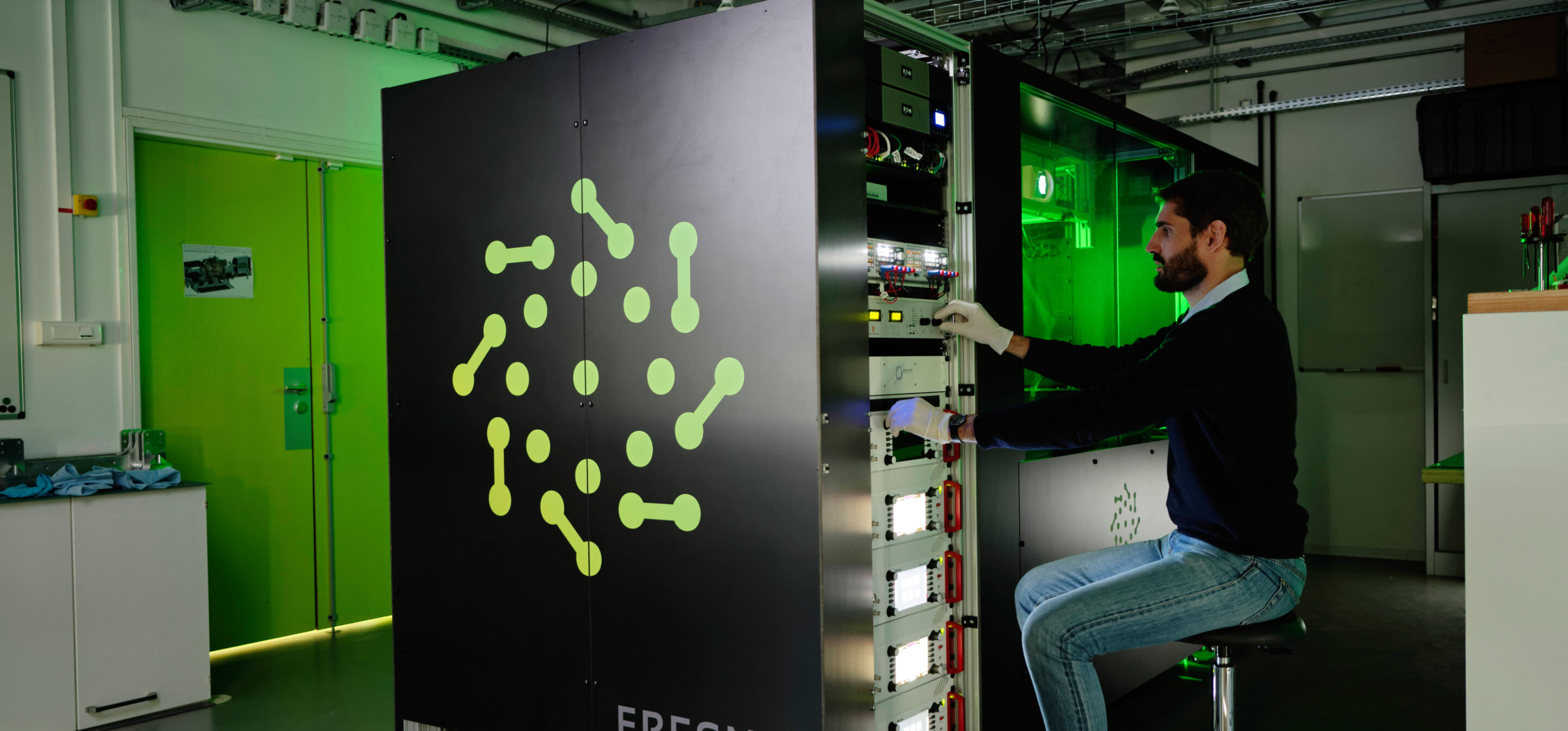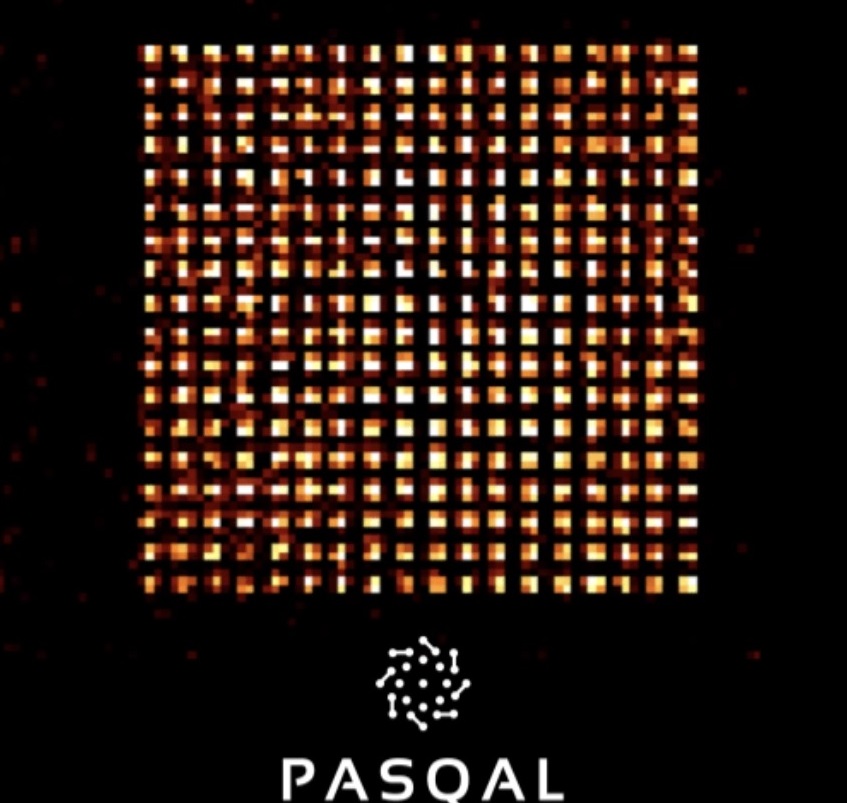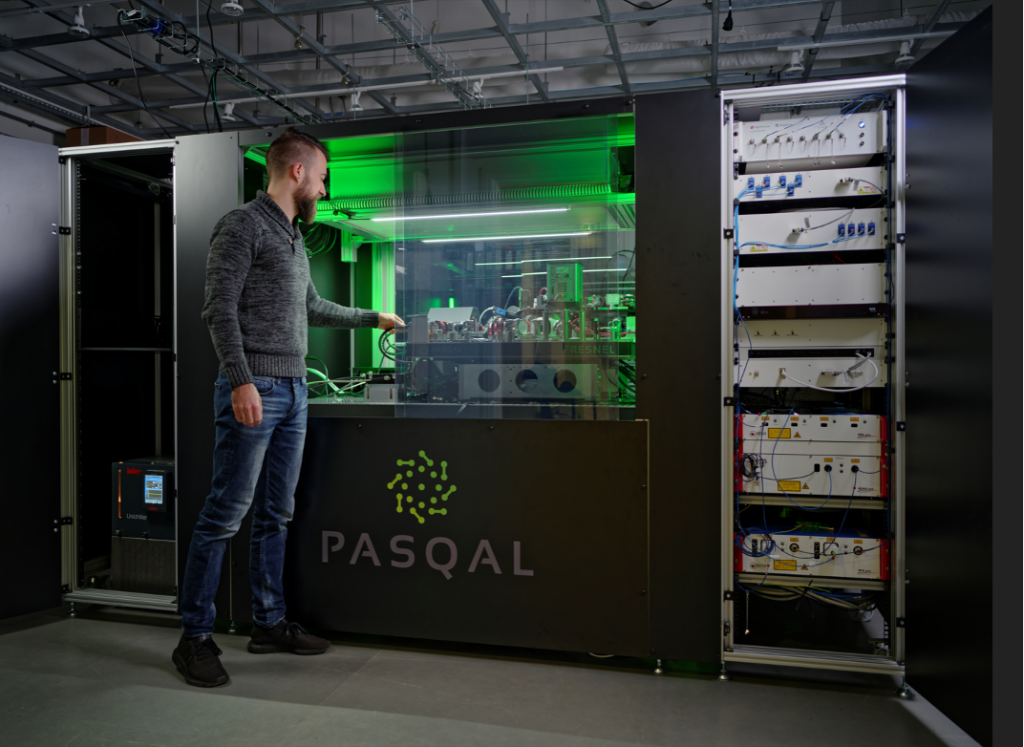- Photonics & Space
Bringing PASQAL quantum processors to industry standards with Exail’s intelligent laser systems


Since April 2020, PASQAL has partnered with Exail (ex-Muquans) to develop cutting edge laser and control solutions to push the technological boundaries of quantum computing. Let’s take a closer look at the company’s neutral atoms based quantum technology and how Exail helps to industrialize the first quantum processors.
Quantum Processing Units out of atomic arrays
PASQAL is a French company developing quantum processors built out of atomic arrays. Co-founded by Alain Aspect, 2022 Physics Nobel Prize, the company exploits a laser-cooled neutral atoms technology to develop its quantum solutions. The quantum property of such neutral atoms makes it possible to use them as quantum bits, a two-level system ruled by the superposition principle. When a classical bit can only store 2 combinations (0 and 1), a qubit can store multiple combinations (0, 1 and combinations in between). The qubits can then be used in digital quantum gates for processing tasks. PASQAL has already sold quantum processors counting 200 qubits and aims at delivering, by 2024, a quantum processor with 1000 qubits, accessible via the Cloud.
The manufacturing of quantum processors can rely on different platforms for the manipulation of quantum systems (photons, ions, atoms, etc.), each one of them facing specific challenges. Quantum processors based on superconducting qubits, for example, rely on a long engraving process of a chip in a cleanroom environment. The quantum systems used by PASQAL to perform its quantum processing are neutral atoms. With this platform, implementing a quantum processing requires going through three distinct phases. First, the preparation of an atomic array, called qubit register. The register is made by cooling and trapping atoms (Rubidium atoms) one by one from an initial cloud of atoms. Then, optical tweezers are used to place each atom in a particular geometrical shape for the calculation. Such a grid formed by individual and identical atoms is generated for each new cycle of calculation. For the last phase, consisting in processing the qubits (atoms trapped in optical tweezers), lasers are used to manipulate the states of the atoms and to generate entanglement. It is then possible to implement a quantum algorithm. The entanglement required to implement quantum processing is a key step for which PASQAL is planning further collaboration with Exail to co-develop more powerful types of lasers, dedicated to this processing phase.
Improving reliability of PASQAL quantum processors with intelligent laser systems
Preparing a register with many qubits without any defects is a real challenge. With the goal to reach a quantum processor counting 1000 qubits, it is important for PASQAL to rely on its sub-systems, and in particular in the laser system that prepares the qubit register. Adrien Signoles, Deputy-CTO at PASQAL, adds that “having laser systems that are truly reliable and robust over time is a crucial point for us on the road to reach industrial-scale quantum processors for the quantum computing market”.

Muquans (now Exail) had worked for more than a decade on the industrialization of complex systems to manipulate cold atoms to develop quantum gravimeters. “We knew that both their laser system, their system to trap atoms and their integration capability were reliable enough to operate a quantum gravimeter from the top of Mount Etna to Antarctica.” explains Adrien Signoles. The intelligent laser systems used to operate the quantum gravimeter was adapted to improve PASQAL’ quantum processors reliability. “Our goal at PASQAL was to go through the same path for the industrialization of our own quantum technology: quantum processors based on neutral atoms.” Exail has been more than a supplier, it has been a partner to develop complex quantum systems based on cold atoms with industry standards. The team of PASQAL has also given feedback along the way so that the laser system could be improved for such a complex technology.
According to Adrien Signoles: “We rely on Exail’s laser system on the first step of our process, to cooldown millions of atoms into a cloud, before trapping them one by one. This is quite a similar process to what is done inside Exail’s quantum gravimeter where a cloud of rubidium atoms laser-cooled close to absolute zero is used as the test mass, to sense minute variations of gravity. At PASQAL we use the same laser wavelength – 780 nm – to cooldown the atoms and manipulate the same type of atoms. It is based on a doubled wavelength – 1560 nm – usually used for telecom applications, which means that all the technology developed at this wavelength have proved its robustness”.
The intelligent laser system acquired by PASQAL is customized, but easy to integrate as it is fibered and ready to operate PASQAL’s quantum processor at the correct wavelength. It is a crucial step towards the industrialization of their system, initially developed in an academic environment where a large optical bench in free space with many optical different devices was needed to shape the laser beams as required. “The laser systems supplied by Exail are now integrated, rack by rack into the PASQAL quantum processor” sums up Adrien Signoles (see below picture).

Developing next-generation HPC (high performance computing) solutions
There is high interest in intelligent laser systems (ILS Series), able to operate cold-atom based quantum technologies such as PASQAL’s quantum processors. HPC centers, for example, are interested in installing quantum processors directly in their supercomputer. The computing capability can then be delivered to answer the needs of large industry companies. Future quantum processor units (QPUs) could soon be incorporated into supercomputers to solve some specific problems that can’t be solved by classical processors. Optimization problems are often taken as applications for which a quantum computer could find much better approximate solutions. Optimizing the charging of electric vehicles is an example on which PASQAL is already working with EDF (Electricity of France). But the quantum processing capabilities offered by PASQAL is also interesting banking companies to improve their predictable models and to deal with other types of machine learning algorithms.


